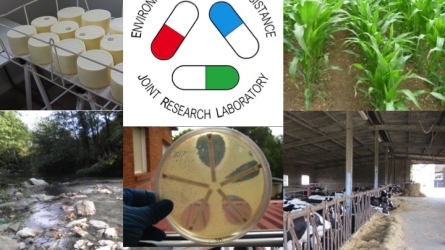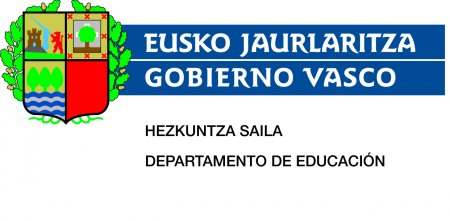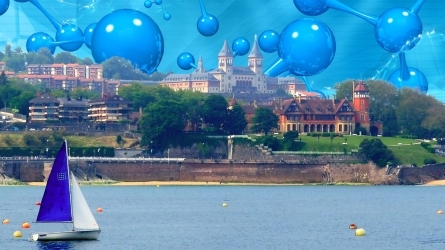
Resistencia a antibióticos en el medio ambiente: origen de un escenario apocalíptico
Description
Infections by multiresistant bacteria are one of the greatest threats to Public Health, causing high costs in lives and economic expenses. But although the most dramatic consequences are observed in the clinics, the problem of the spread of resistance to antibiotics has its origin in the environment (i.e., agriculture, livestock and urban environments). This situation poses the challenge of integrating different scenarios to arrive to a holistic solution.
To date, the problem of the emergence of resistant bacteria has been addressed mainly in relation to the use and abuse of antibiotics in medicine and veterinary. On the contrary, the role of the environment in this problem and, in particular the adverse impact on human health and ecosystems derived from the presence in the environment of (i) antibiotics, (ii) bacteria resistant to antibiotics, (iii) antibiotic resistance genes and (iv) mobile genetic elements (plasmids, integrons, transposons) involved in the horizontal transfer of genes, has received very little attention.
These emerging pollutants are not only disrupting the functioning of ecosystems and they are present in exposure routes that through different vectors, such as consumption of water and food, end in humans. Recently, the United Nations (UN) has warned against the increase in resistance to antibiotics as a result, in part, of the release and dumping of these drugs into the environment. In fact, resistance to antibiotics is one of the six emerging areas of concern highlighted in the UN Environment Frontiers Report 2017.
Objectives
To train students in basic and applied knowledge about the role of the environment in the generation and dissemination of resistance to antibiotics and its impact on environmental and human health.
Deepen the mechanisms of action of antibiotics and of bacterial resistance.
Understand the processes of dissemination of antibiotic resistance among bacteria, the role of the environment and the consequences for human and environmental health.
Present current methodologies for the quantification and evaluation of environmental risk associated with antibiotic resistance.
Highlight the impact of climate change on the already existing antibiotic resistance problem.
In addition, students are expected to develop and strengthen scientific communication skills through the preparation of dissemination material through their participation in a workshop.
Raise awareness of the problem of antibiotic resistance in the clinical, agro-livestock, food and urban environments.
Activity directed to
- University students
- Non-university students
- Teachers
- Professionals
- All public
- Researchers
Contributors
Program
18-07-2019
Entrega de documentación
Presentación del Curso
“Resistencia a los antibióticos, una amenaza para la salud global“
- Lucía Gallego Andrés UPV/EHU - Profesora Titular del Departamento de Inmunología, Microbiología y Parasitología, Facultad de Medicina y Enfermería
“Mecanismos de resistencia bacteriana y transferencia horizontal de genes“
- Itziar Alkorta Calvo UPV/EHU - Profesora Titular del Departamento de Bioquímica y Biología Molecular, Facultad de Ciencia y Tecnología
Break
“Cambio climático, salud y resistencia a antibióticos“
- María José Sanz Sánchez BC3, Basque Centre for Climate Change - Directora Científica
“Depuradoras de aguas residuales: puntos calientes de la generación y diseminación de resistencia a antibióticos“
- Maria Estilita Ruiz Romera UPV/EHU - Profesora Titular del Departamento de Ingeniería Química y del Medio Ambiente
Descanso-Comida
“Uso de antibióticos en agricultura“
- Maite Lacuesta UPV/EHU - Profesora Titular del Departamento de Biología Vegetal y Ecología, Facultad de Ciencia y Tecnología
- Usue Pérez López UPV/EHU - Profesora Agregada del Departamento de Biología Vegetal y Ecología, Facultad de Ciencia y Tecnología
“Impacto de la ganadería sobre la resistencia a los antibióticos“
- Ana Hurtado Neiker-Tecnalia - Investigadora del Departamento de Sanidad Animal
Synthesis
19-07-2019
“Residuos de antibióticos y genes de resistencia en alimentos de consumo humano“
- Mailo Virto Lekuona UPV/EHU - Profesora Titular del Departamento de Bioquímica y Biología Molecular, Facultad de Farmacia
“Generación y diseminación de resistencias a antibióticos en el medio ambiente“
- Carlos Ander Garbisu Crespo Neiker-Tecnalia - Jefe del Departamento de Conservación de Recursos Naturales
Break
“Técnicas innovadoras para la cuantificación de residuos de antibióticos en muestras ambientales “
- Néstor Etxebarria Loizate UPV/EHU - Catedrático del Departamento de Química Analítica, Facultad de Ciencia y Tecnología
“Herramientas ecotoxicológicas para la evaluación del impacto de los antibióticos en el medio ambiente “
- Manu Soto López UPV/EHU - Catedrático del Departamento de Zoología y Biología Celular Animal y Vicedirector del PiE
Synthesis
Descanso-Comida
“Taller Ciencia y Salud. Resistencia a los antibióticos y medios de comunicación: claves para la sensibilización a la ciudadanía/Antibiotikoen aurkako erresistentzia eta komunikazio bideak: gakoak Herritartasuna sentsibilizatzeko“
- Lucía Gallego Andrés UPV/EHU - Profesora Titular del Departamento de Inmunología, Microbiología y Parasitología, Facultad de Medicina y Enfermería
- Manu Soto López UPV/EHU - Catedrático del Departamento de Zoología y Biología Celular Animal y Vicedirector del PiE
Conclusiones finales
Directors

Itziar Alkorta Calvo
Universidad del País Vasco, Titular de Universidad
Itziar Alkorta, degree in Chemistry and Biochemistry PhD (UPV/EHU). She did a postdoctoral stay at the University of California, Berkeley. Currently, she is a lecturer in Biochemistry and Molecular Biology Dept, UPV/EHU. She directs a research group focused on understanding the molecular mechanism of bacterial conjugation to provide solutions to the problem of the spread of antibiotic resistance among bacteria. She has supervised numerous doctoral theses, master thesis and graduate works. Shee has written nearly 120 scientific and science dissemination articles, and she has led and participated in numerous research projects. She has been director of the Biofisika Institute (UPV/EHU, CSIC), Vice-Dean of the Faculty of Science and Technology and member of the Board Committee of the Spanish Society of Biochemistry and Molecular Biology. Since 2017 she is a member of AKADEME II. Currently, she is the coordinator of the Joint Research Laboratory on Environmental Antibiotic Resistance.
Speakers

Néstor Etxebarria Loizate
Nestor Etxebarria, Doctor CC Químicas (1993, UPV/EHU), Catedrático (2011, UPV/EHU) y actualmente director del Dpto Química Analítica. Pertenezco al grupo de investigación IBeA (www.ehu.eus/Ibea). También formo parte de la Estación Marina de Plentzia (PiE, www.ehu.eus/PIE). He investigado sobre química en disolución (Tesis Doctoral), implementación del análisis por activación neutrónica para el control de producción de materiales de referencia (postdoct en JRC-IRMM, Bélgica) y sobre análisis ambiental de contaminantes orgánicos y en ecotoxicología ambiental (actualidad). Soy coautor de más de 130 publicaciones científicas e investigador principal de 3 proyectos de la Agencia Nacional de Investigación. He dirigido 13 tesis doctorales y más de 25 tesis de máster. Soy coautor de cuatro libros de texto universitarios y fui coordinador del grado de Química (2008-2011) y actualmente pertenezco al comité académico del Erasmus Mundus Master in Marine Environment and Resource.

Lucía Gallego Andrés
Universidad del País Vasco UPV/EHU
Lucía Gallego, Graduated in Medicine and Surgery, Master in Recombinant DNA Technology, PhD in Medicine and Surgery. Prof. of Medical Microbiology, Faculty of Medicine & Nursing, University of the Basque Country UPV/EHU. Representative of the Faculty of Medicine & Nursing in the National Plan Against Antibiotic Resistance (PRAN) of the Spanish Agency of Medicines and Health Products (AEMPS). Head of the Acinetobacter baumannii Research Group working on the study of antibiotic resistance and its dissemination through mobile genetic elements among clinical isolates causing serious hospital-acquired infections that have become a worldwide threat as multidrug-resistant isolates have dramatically risen worldwide. Collaborations with international groups from Germany, Egypt, Bolivia and UK, Author of 53 international publications, 9 book chapters, 79 international congress. Participation in 54 research projects, 28 as PI. Supervisor of 12 PhD, 12 MSc, 16 undergraduates, 6 OWSD mentoring

Carlos Ander Garbisu Crespo
NEIKER, Director Científico
Dr. Garbisu is the Scientific Director at NEIKER, The Basque Institute of Agricultural Research and Development (Spain), where he leads the Soil Microbial Ecology Group (http://www.soilmicrobialecology.com). He obtained his PhD degree in Biology at King’s College London (1992). Then, he carried out postdoctoral studies in the Department of Biochemistry and Molecular Biology of the University of the Basque Country (1992-1993, 1996-1997) and in the Department of Plant Biology of the University of California at Berkeley (1993-1996). He has published more than 135 international papers (h-index=42), participated in more than 70 research projects, and taught a great deal of courses at the university level. He has participated in many scientific committees and acted as project evaluator for many organizations.

Ana Hurtado
Ana Hurtado. Doctora por la Universidad de Londres con más de 20 años de experiencia investigadora en microbiología molecular en distintos centros (Central Public Health Laboratory Service, Londres; Universidad Miguel Hernández; NEIKER). Desde 2001 es Investigadora en el Departamento de Sanidad Animal de NEIKER, donde es responsable de la línea de investigación en Seguridad Alimentaria, en la que estudia el papel de la producción primaria en la producción de alimentos sanos y seguros, y el impacto de la ganadería sobre las resistencias antimicrobianas. Representa a NEIKER en los Programas de Actuación frente a las Resistencias a Antibióticos a nivel autonómico (RAM-Euskadi) y nacional (PRAN). Ha participado en 28 proyectos de investigación y ha dirigido 5 Tesis Doctorales. Es autora de 90 artículos con evaluación por pares en revistas internacionales y 4 capítulos de libros (h = 28) y ha participado en más de 100 comunicaciones en Conferencias Científicas nacionales e internacionales

Maite Lacuesta
Maite Lacuesta is a Full Professor of Plant Physiology at the at the UPV / EHU university. She teaches in the Pharmacy and jn Environmental Sciences degrees and also in the master's degrees in Environmental Agrobiology and Innovative Oenology at the same university. She is a membership of the research group on Climate change and bioenergetic crops, which analyzes the interaction of the increase in CO2 and the main associated stresses (temperature, drought, salinity), in the physiology and productivity of plant species of agronomic interest. She has published more than 50 international papers and has participated in numerous research projects, being Research Leader of 10 of them. She is supervisor of 3 doctoral theses, two of them International. Currently she is supervising a PhD focused in teh symbiotic interaction between legumes, and rhizobia strains trying to select efficient inocula that allow plants to improve their productivity in drought conditions. The works is being carried out in conventional and ecological conditions, as a healthier and environmentally sustainable alternative.

Usue Pérez López
Usue Pérez es Profesora Agregada de Fisiología Vegetal del Departamento de Biología Vegetal y Ecología de la UPV/EHU. Imparte docencia en los grados de Biología, Bioquímica y Biología Molecular, Biotecnología y Ciencia y Tecnología de los Alimentos y en el máster de Enología Innovadora de la UPV/EHU. Como miembro del grupo de investigación FisioClimaCO2, lleva varios años analizando la interacción del incremento del CO2 y los principales estreses asociados en la fisiología y productividad de diferentes especies vegetales. Los resultados se han publicado en más de 20 publicaciones internacionales y ha participado en diferentes proyectos de investigación. Actualmente, dirige dos Tesis Doctorales sobre interacción de factores asociados al cambio climático en cebada y quinoa, buscando los mecanismos fisiológicos que dichas especies ponen en marcha bajo condiciones climáticas futuras al objeto de buscar características de tolerancia para mantener la seguridad alimentaria en el futuro.

Maria Estilita Ruiz Romera
Estilita Ruiz Romera. Doctora en CC Químicas (UPV/EHU, 1990). Titular Departamento de Ingeniería Química y del Medio Ambiente (UPV/EHU, desde 1990) y acreditada a Catedra (ANECA, junio 2016). Investigación Medio Ambiente (impacto sobre Aguas y Suelos de intervenciones antrópicas), impacto de pesticidas en la actividad microbiana del suelo, evaluación hidro-sedimentaria y contaminación de sedimentos. Cabe mencionar la integración de procesos hidrológicos, químicos y biológicos al estudio de impactos generados en cuencas urbanas fuertemente antropizadas. He participado en 31 proyectos de investigación, 4 europeos (13 como IP), en publicaciones en revistas con JCR, ISBN o libros (total de 75). Contribuciones a congresos (más de 65). En los últimos 10 años, he dirigido 5 tesis doctorales (3 europeas) y 2 en ejecución, una de ellas cotutelada con la Universidad de Toulouse. He dirigido 32 Proyectos fin de carrera; 15 Proyectos de Cooperación con empresas, 12 Proyectos fin de Master.

Mailo Virto Lekuona
UPV/EHU, Catedrática de Universidad
Mailo Virto. Doctora en Ciencias Biológicas (UPV/EHU, 1992). Investigadora en la Fundación INASMET (1990-1993) donde estudió el uso de enzimas en la modificación de lípidos y su aplicación industrial. Desde 1993 Profesora del departamento Bioquímica y Biología Molecular UPV/EHU, Catedrática desde 2019 y miembro del Grupo de investigación Lactiker, donde ha estudiado la bioquímica de la maduración del queso, caracterización de los enzimas coagulantes, relación entre alimentación animal y características nutricionales de leche y queso y relación entre la ingesta de grasa láctea y el desarrollo de enfermedades cardiovasculares. Autora de más de 40 publicaciones científicas en revistas internacionales. Ha dirigido 8 proyectos de investigación financiados por organismos públicos y un contrato con empresa, y ha participado en más de 40 proyectos y contratos. Ha codirigido seis tesis doctorales. Secretaria Académica (2003-2012) y Decana de la Facultad de Farmacia (2012-17)
Prof. Sanz holds a Ph.D. in Biological Sciences from the Universidad de Valencia (1991) and has expertise in several scientific areas like Ecophysiology, Air pollution effects, lower and higher plants, Atmospheric dynamics and chemistry, Nitrogen and carbon cycles, Greenhouse Gasses and other related gases, Greenhouse gas inventories, LULUCF and REDD+. She has been strongly involved in the policy dimension of Climate Change, guiding political decisions carried out at centres such as the FAO (United Nations Food and Agriculture Organisation) or the UNFCCC (United Nations Framework Convention on Climate Change). She has an expertise on multilateral processes, regulatory frameworks, policy measures and instruments of Climate Change Policy, and led the implementation of different programmes with a multidisciplinary-based approach.

Manu Soto López
Manu Soto. Professor of Cell Biology (2011, UPV/EHU) and since 2012 Deputy Director of the Plentzia Marine Station (UPV/EHU). Researcher of the Consolidated Research Group on Cell Biology in Environmental Toxicology. European doctoral thesis (1995, UPV/EHU). Studies at University College of Wales, Univ of Innsbruck, Univ Azores and Univ of Wales. He has supervised 7 PhD theses (+3 in progress), master's thesis (18) and bachelor's thesis (7). Interest in the development and application of biomarkers against exposure to metals in aquatic and terrestrial organisms. More than 100 scientific publications and more than 200 contributions in national and international conferences. He has coordinated research projects financed by the Ministry of Education, Economy, Competitiveness, University of the Basque Country, Basque Government, and contracts with municipalities, local and state environmental agencies and private companies. Vice Dean of the Faculty of Science and Technology (2006-2012).
Registration fees
| REGISTRATION | Until 31-05-2019 | Until 18-07-2019 |
|---|---|---|
| 60,00 EUR | 70,00 EUR | |
| 35,00 EUR | - | |
| 20,00 EUR | 20,00 EUR | |
| 35,00 EUR | - |
Venue
Plentzia Marine Station-(PiE-UPV/EHU)
Areatza Pasealekua 48620 Plentzia
Bizkaia






